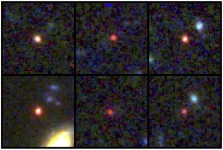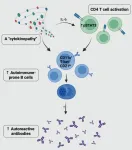Recent developments include a new understanding of how HPV drives cancer development, a combination therapy to overcome treatment resistance in mantle cell lymphoma, novel insights into memory T cell formation and potential therapeutic strategies for brain cancers, improved survival outcomes for metastatic colorectal cancer, targeting myeloperoxidase to improve immunotherapy responses in melanoma, and preclinical results of a combination therapy that could effectively treat a subset of acute myeloid leukemia.
Study reveals a previously unreported form of genomic structural variation, exposing a new model for how HPV drives cancer development
A new study using long-read DNA sequencing unravels a long-standing “chicken or the egg” mystery in how the human papillomavirus (HPV) affects, or is affected by, host DNA and how that process drives cancer development. Led by Maura Gillison, M.D, Ph.D., Keiko Akagi, Ph.D., and David Symer, M.D., Ph.D., the authors describe a previously unreported form of genomic structural variation, termed heterocateny, which is characterized by diverse, interrelated and repetitive patterns of virus and host DNA segments within a cancer. Heterocateny is the result of genetic instability caused by HPV insertion into and excision from host chromosomes, a process by which the virus hijacks, amplifies and recombines host DNA. With this new heterocateny model, the authors demonstrate for the first time how HPV contributes to intratumoral heterogeneity and clonal evolution, driving the creation and development of tumors. Learn more in Cancer Discovery.
Co-targeting MALT1 and BTK may help overcome resistance to BTK inhibitors in mantle cell lymphoma
Resistance to BTK inhibitors is a major clinical challenge for patients with mantle cell lymphoma (MCL), an aggressive subtype of non-Hodgkin lymphoma. While these targeted therapies are effective initially, relapses are frequent. To better understand the development of this resistance, researchers led by Vivian Jiang, Ph.D., performed gene expression profiling on nine MCL cell lines with different degrees of sensitivity to BTK inhibitors. They identified MALT1 as one of the most differentially expressed genes, with the highest expression in resistant cells. Targeting both BTK and abnormal MALT1 activity produced anti-tumor responses in resistant laboratory models, suggesting this combination approach could be a promising therapeutic strategy to overcome resistance to BTK inhibitors and improve the efficacy of MCL treatment. Learn more in The Journal of Clinical Investigation.
Tumor-specific brain-resident memory T cells defend against relapse in glioblastoma
Tissue-resident memory T cells (TRM) have been detected in many malignancies, but the induction or recruitment of brain TRM after immunotherapy has not been seen in glioblastoma (GBM). FGL2 is an immunosuppressive regulator of T cells, and its expression has been associated with poor outcomes in GBM. While FGL2 antibodies exhibit anti-tumor activity, they are largely ineffective against brain tumors due to their inability to cross the blood-brain barrier. In this study, researchers led by Shulin Li, Ph.D., demonstrated that T cells armed with FGL2-blocking antibody fragments (single-chain variable fragments) induced brain tumor-specific CD8+ TRM cells that could be effectively transplanted and activated in both immunocompetent and T cell-deficient GBM preclinical models. This process resulted in a strong anti-tumor response, increasing the number of brain CD8+ TRM cells and preventing recurrence in these models. This study provides novel insights into brain TRM cell formation, uncovering potential therapeutic strategies for various brain cancers. Learn more in Nature Communications.
Overall survival has improved for patients with metastatic colorectal cancer
The past 20 years have seen significant progress in the understanding and treatment of colorectal cancer (CRC), but this progress has not been systematically documented. For example, the life expectancy of patients with metastatic CRC treated on clinical trials has steadily improved, but it was unknown if patients not participating in a trial experienced the same benefit. Researchers led by John Paul Shen, M.D., utilized a novel software platform to review 1,420 patients with metastatic CRC who received treatment at MD Anderson between 2004 and 2019. The retrospective study showed that survival rates have improved steadily, beginning with patients diagnosed after 2012. Surgical resection of liver metastasis, use of immunotherapy and use of third-line chemotherapy were identified as the likely drivers of better survival. Yet despite these significant improvements, most patients with metastatic CRC did not survive five years after diagnosis, underscoring the urgent need for additional research. Learn more in npj Precision Oncology.
Inhibiting myeloperoxidase improves response to immune checkpoint inhibition in melanoma
One of the limiting factors on the effectiveness of immune checkpoint inhibitor therapy in melanoma is a highly immunosuppressive microenvironment. Critical contributors to this microenvironment are myeloid cells, which have a negative correlation to the effectiveness of checkpoint inhibitors. One of the primary immunosuppressive mechanisms is believed to be the production of reactive oxygen species, with the myeloid cell-specific enzyme myeloperoxidase being a major source. In a preclinical study led by David Piwnica-Worms, M.D., Ph.D., use of verdiperstat – a myeloperoxidase-specific inhibitor – enhanced responses to immune checkpoint inhibition in two models, demonstrating the potential for myeloperoxidase inhibitors to be an effective adjuvant with immunotherapies. Long-term survival was 100% in the primary model when checkpoint inhibitors were used in combination with verdiperstat, highlighting its therapeutic potential. Learn more in the Journal for ImmunoTherapy of Cancer.
Preclinical study identifies potentially curative combination therapy for NPM1/FLT3-mutant acute myeloid leukemia
Approximately 30% of patients with acute myeloid leukemia (AML) carry a mutation in NPM1, which is often accompanied by mutations in FLT3 – the most frequently mutated gene in AML. Unfortunately, FLT3 inhibitors alone do not cure FLT3-mutant AML, but previous studies suggest that targeting menin may be effective in NPM1-mutant AML. To test this, researchers led by Bing Carter, Ph.D., and Michael Andreeff, M.D., Ph.D., evaluated the combination of menin inhibitor SNDX-50469 together with an FLT3 inhibitor (gilteritinib), a BCL-2 inhibitor (venetoclax) and a hypomethylating agent (5-azacytidine). In patient-derived models of NPM1/FLT3-mutant AML, the combined therapy had superior anti-leukemia activity, effectively reduced target protein levels and was well tolerated. While untreated controls survived just 62 days, 60% of the treatment group was alive and leukemia free after 414 days. The authors note this is the first time that NPM1/FLT3-mutant leukemia could be cured in preclinical models, suggesting this combination may be a worthwhile approach for clinical studies. Learn more in Haematologica.
Recent awards and honors
Jennifer Wargo, M.D., professor of Genomic Medicine and Surgical Oncology, was honored with the Sergio Lombroso Award in Cancer Research by the Weizmann Institute of Science In case you missed it
Read below to catch up on recent MD Anderson press releases.
Baseball legend Dusty Baker honored with more than $1.5 million raised for cancer research MD Anderson receives nearly $19.4 million in CPRIT funding MD Anderson and Xilis announce strategic collaboration to advance novel technology and accelerate therapeutic development MD Anderson and KKR-backed Replay form new product company Syena to pioneer first-in-class TCR NK cell therapy Lung cancer study finds new target for treatment resistance after EGFR inhibitors Lung cancer screening more cost effective when using risk model-based strategies New cell death mechanism could offer novel cancer treatment strategies MD Anderson announces new collaboration in Indonesia to reduce global cancer burden
- 30 -
END


